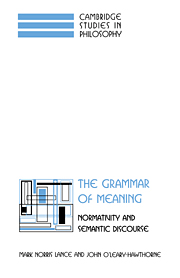Book contents
- Frontmatter
- Contents
- Acknowledgments
- Introduction
- PART I THE PLACE OF MEANING TALK IN SOCIO-LINGUISTIC PRACTICE
- PART II NATURALISM AND MEANING TALK
- 4 The epistemology of meaning and the analysis of meaning
- 5 Robust meaning theories and canonical dispositions
- 6 Reduction and naturalism
- 7 Realism and factuality
- Bibliography
- Index
6 - Reduction and naturalism
Published online by Cambridge University Press: 05 December 2011
- Frontmatter
- Contents
- Acknowledgments
- Introduction
- PART I THE PLACE OF MEANING TALK IN SOCIO-LINGUISTIC PRACTICE
- PART II NATURALISM AND MEANING TALK
- 4 The epistemology of meaning and the analysis of meaning
- 5 Robust meaning theories and canonical dispositions
- 6 Reduction and naturalism
- 7 Realism and factuality
- Bibliography
- Index
Summary
Witty thoughts must at least appear to be grounded in reason, but they should not be scrutinized too minutely, just as we ought not to look at a painting from too close.
G. W. Leibniz, New Essays on Human Understanding, p. 141NATURALISM AND MEANING DISCOURSE
Ontological naturalism, epistemological naturalism
Our topic in this chapter is reductive naturalism about meaning discourse, i.e. the project of providing interesting analyses of meaning discourse using the language of natural science. While having no general hostility to modal theorizing, we believe that the prospects for generating interesting and explanatory modal generalizations that link meaning to the language of natural science is quite limited. As a consequence, the prospects for rich and explanatory analyses of meaning of the sort that contemporary philosophers hope for is quite limited.
Of course, the term “naturalist” need not be, and has not always been, associated with this strong reductive project. That project is but one manifestation of the desire to see human beings as part of the natural world. As a preliminary clarification, we might usefully distinguish here between naturalism in epistemology and naturalism in ontology. Naturalism in ontology is the project of considering each putative phenomenon and then rendering its nature intelligible in terms of the language of natural science or else dismissing it as a fiction.
- Type
- Chapter
- Information
- The Grammar of MeaningNormativity and Semantic Discourse, pp. 344 - 372Publisher: Cambridge University PressPrint publication year: 1997



